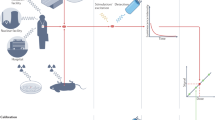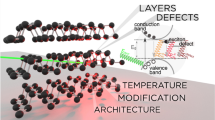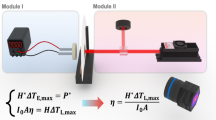Abstract
THERMOLUMINESCENCE may be observed from many chemical compounds, both in crystalline and in amorphous form. The compounds so far investigated have usually been mineral or synthetic materials, but there is no reason to suppose that the various salts deposited in biological materials have a structure excluding this property.
This is a preview of subscription content, access via your institution
Access options
Subscribe to this journal
Receive 51 print issues and online access
$199.00 per year
only $3.90 per issue
Buy this article
- Purchase on Springer Link
- Instant access to full article PDF
Prices may be subject to local taxes which are calculated during checkout
Similar content being viewed by others
References
Jaworowski, Z., Peńsko, J., Nature, 214, 161 (1967).
Niewiadomski, T., Nukleonika, 12, 281 (1967).
Daniels, F., Boyd, C. A., Saunders, D. F., Science, 117, 343 (1953).
Aitken, M. J., Fleming, S. J., Zimmerman, D. W., Nature, 219, 442 (1968).
Author information
Authors and Affiliations
Rights and permissions
About this article
Cite this article
JASIŃSKA, M., NIEWIADOMSKI, T. Thermoluminescence of Biological Materials. Nature 227, 1159–1160 (1970). https://doi.org/10.1038/2271159b0
Received:
Issue Date:
DOI: https://doi.org/10.1038/2271159b0
Comments
By submitting a comment you agree to abide by our Terms and Community Guidelines. If you find something abusive or that does not comply with our terms or guidelines please flag it as inappropriate.



